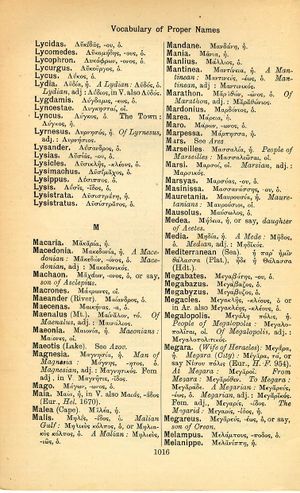Masinissa
ἄλλαι μὲν βουλαὶ ἀνθρώπων, ἄλλα δὲ Θεὸς κελεύει → man proposes, God disposes | men's wishes are different from what God orders | man's will is often different than God's decisions
English > Greek (Woodhouse)
Μασσανάσσης, -ου, ὁ.
Latin > English (Lewis & Short)
Măsĭnissa: (Măsănīsa, Oros. 4, 18), ae, m.,
I a king of Numidia, grandfather of Jugurtha, at first the enemy and afterwards the friend and ally of the Romans, Liv. 24, 48; 25, 34 sq.; Cic. Rep. 6, 9, 9; id. Sen. 10; Sall. J. 5, 5; 9, 2; 24, 10; 65, 1; Ov. F. 6, 769; Sil. 16, 117.
Latin > French (Gaffiot 2016)
Măsinissa,¹² æ, m., roi des Numides : Cic. Rep. 6, 9 ; CM 34 ; Sall. J. 5, 5, etc. ; Ov. F. 6, 769.
Latin > German (Georges)
Masinissa, ae, m. (Μασσινισσας, gew. Μασσανάσσης), König von Numidien, Vater des Micipsa, Großvater Jugurthas, großer Freund der Römer, Liv. lib. 24 sqq. Cic. de rep. 6, 9. Sall. Iug. 35. Ov. fast. 6, 769. Sil. 16, 117. – Nbf. Massinissa, Corp. inscr. Lat. 1, 200, 81, auch Oros. 4, 18, 21 cod. L; Massanissa (Μασσανάσσας), Oros. 4, 20, 36 codd. RD.

